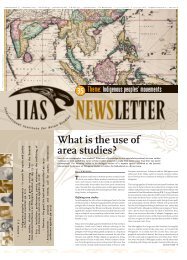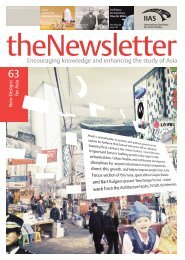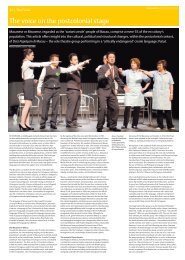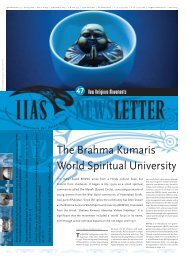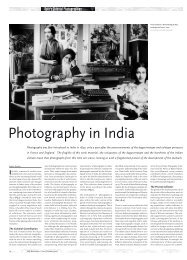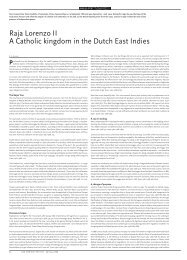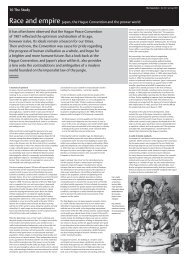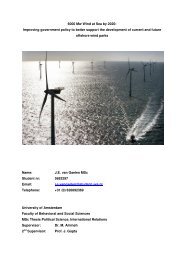Sex, love and revolution - IIAS
Sex, love and revolution - IIAS
Sex, love and revolution - IIAS
You also want an ePaper? Increase the reach of your titles
YUMPU automatically turns print PDFs into web optimized ePapers that Google loves.
c o n t i n u e d f r o m p a g e 1 ><br />
T H E M E W o m e n W a r r i o r s<br />
the subject of bitter criticism within <strong>and</strong><br />
outside the movement. After acrimonious<br />
debates, Communist Party leaders<br />
drew up a remarkable document entitled<br />
“Revolutionary Solution of the <strong>Sex</strong> Problem”<br />
that permitted married male guerrillas<br />
to have extramarital relationships<br />
with single female cadres as long as they<br />
followed strict regulations. 5 Claiming ‘biological<br />
necessity’, the frustrated cadre was<br />
expected to present his problem to his<br />
superiors <strong>and</strong> convince them that either<br />
his health or his work was being adversely<br />
affected by the absence of his wife. After<br />
an unofficial review, a married man was<br />
allowed to take a ‘forest wife’ as long as<br />
both his legal <strong>and</strong> forest wives were aware<br />
of the arrangement, <strong>and</strong> he agreed to settle<br />
down with only one woman at the end<br />
of the struggle.<br />
The Huk leadership also worried greatly<br />
about what they called ‘the family problem’,<br />
the reluctance of both women <strong>and</strong> men to<br />
become more active in the rebellion, <strong>and</strong><br />
to join the ‘expansion teams’ attempting<br />
to spread the insurgency beyond its<br />
stronghold in Central Luzon, because this<br />
meant separating from their families. Men<br />
also frequently embezzled movement<br />
funds in order to support their families.<br />
And there was the ‘baby problem’, when<br />
dedicated female <strong>revolution</strong>aries left the<br />
movement once they got pregnant. 6 The<br />
Party’s solution to these problems was to<br />
encourage the integration of spouses <strong>and</strong><br />
older children into the movement, <strong>and</strong> the<br />
distribution of younger children to friends<br />
<strong>and</strong> relatives not involved in the rebellion.<br />
These discussions reveal the significance<br />
of sexual <strong>and</strong> gender tensions within the<br />
Huk movement, but the regulations the<br />
leadership imposed placed women under<br />
the political <strong>and</strong> sexual control of men.<br />
Private desires<br />
in the public realm<br />
Indeed, midst the exceptional circumstances<br />
of female participation in the Huk<br />
movement, most of them also fell into<br />
quite typical patterns of romance, marriages,<br />
pregnancy <strong>and</strong> childbearing. Throughout,<br />
Huk women struggled to reconcile<br />
their personal desires for intimacy with the<br />
impersonal aims of the <strong>revolution</strong>, while<br />
Huk men navigated uneasily between the<br />
dem<strong>and</strong>s of matrimonial responsibility<br />
<strong>and</strong> what they referred to as ‘biological<br />
necessity’. In practice, both sexes tended<br />
to default to more traditional gender roles,<br />
<strong>and</strong> in so doing missed a unique chance to<br />
transform their <strong>revolution</strong>ary rhetoric into<br />
an even more <strong>revolution</strong>ary reality.<br />
Ultimately, the Huks’ hesitant <strong>and</strong> contradictory<br />
attitude towards women compromised<br />
both the commitment of individual<br />
cadres <strong>and</strong> the strength of the movement.<br />
While the inclusion of women in the Huk<br />
Rebellion introduced unanticipated strains,<br />
within those very challenges lay latent<br />
opportunities. Although many women in<br />
the movement never really left their traditional<br />
roles, others were transformed<br />
through the dem<strong>and</strong>s placed upon them,<br />
finding within themselves wellsprings of<br />
political activism <strong>and</strong> creativity only partially<br />
tapped by the <strong>revolution</strong>’s leadership.<br />
By actively recruiting women yet relegating<br />
them to support roles, by advancing a<br />
few women to positions of comm<strong>and</strong> yet<br />
allowing most to serve the sexual needs of<br />
male leaders, the party fostered disaffection<br />
amongst Huk men <strong>and</strong> women in its<br />
ranks. By promoting patriarchal assumptions<br />
about gender roles <strong>and</strong> sexuality, but<br />
failing to take into consideration the extent<br />
to which participation in the Huk movement<br />
transformed attitudes towards gender<br />
<strong>and</strong> sexuality amongst Huk men <strong>and</strong><br />
women, Huk leaders allowed an organisational<br />
strength to become an organisational<br />
liability.<br />
Nonetheless, despite their limitations, the<br />
Huks did make the emotional <strong>and</strong> sexual<br />
lives of their male <strong>and</strong> female members<br />
part of the <strong>revolution</strong>ary agenda. <strong>Sex</strong> <strong>and</strong><br />
family moved from the private to the public<br />
realm, <strong>and</strong> the private interests <strong>and</strong><br />
desires of individual cadres were weighed<br />
in relation to the collective interests of the<br />
<strong>revolution</strong>ary movement. Personal issues<br />
of family, sex, <strong>and</strong> morality became integral<br />
to the movement’s political <strong>and</strong> social<br />
goals, <strong>and</strong> were subject to bureaucratic<br />
<strong>and</strong> administrative control. Indeed, the<br />
The Philippines Free Press declares, “Leonora Hipas, a former pistol-packing Amazon, is shown as<br />
she <strong>and</strong> her new husb<strong>and</strong> surrendered to the government. With the Huks she dressed like a man.<br />
Like all girls, she wanted a wedding gown for her marriage.” Courtesy Rizal Library, Ateneo de Manila<br />
University.<br />
Huks attempted not only to <strong>revolution</strong>ise<br />
politics but also gender relations within<br />
<strong>and</strong> outside the movement. But this was a<br />
sexual <strong>and</strong> gender <strong>revolution</strong> that remains<br />
unfinished up to this day.<br />
Finding a balance in<br />
<strong>revolution</strong>ary life<br />
Women in the Vietnamese Revolution<br />
also attempted to balance their personal<br />
<strong>and</strong> <strong>revolution</strong>ary lives, but the leadership<br />
did not merely replicate Huk sexual<br />
<strong>and</strong> familial policies. From the beginning,<br />
Ho Chi Minh called on the women to join<br />
the struggle for Vietnam. Since 1930, Party<br />
doctrine had encouraged women to believe<br />
there was a place in the Party hierarchy for<br />
them, <strong>and</strong> that they would not be tied to<br />
the home <strong>and</strong> the dem<strong>and</strong>s of their husb<strong>and</strong>s<br />
<strong>and</strong> oppressive mothers-in-law. By<br />
the 1940s, the Party was advocating “universal<br />
suffrage, democratic liberties, equality<br />
among all ethnic groups <strong>and</strong> between<br />
men <strong>and</strong> women”. “Uncle Ho” had also<br />
spoken informally of an end to arranged<br />
marriages <strong>and</strong> of the opportunities for<br />
women to learn to read, study, participate<br />
in politics <strong>and</strong> be truly men’s equals. And<br />
women - from both the North <strong>and</strong> the<br />
South - responded enthusiastically to his<br />
call to fight against the returning French<br />
colonial forces during the First Indochina<br />
War (1946-1954) <strong>and</strong> the US-backed South<br />
Vietnamese government during the Second<br />
Indochina War (1959-1975). 7<br />
Like Huk women, the Vietnamese women,<br />
at their sexual <strong>and</strong> emotional prime, were<br />
separated from family <strong>and</strong> familiar support<br />
networks, <strong>and</strong> endured days <strong>and</strong><br />
months of hardships, isolation <strong>and</strong> suffering<br />
as guerrillas. But unlike the Huks,<br />
there seemed to be no clear policy on<br />
sexual <strong>and</strong> personal relationships in the<br />
Viet Minh. During the early years of the<br />
Vietnamese Communist movement, in the<br />
1920s <strong>and</strong> 1930s, in efforts to ‘proletarianise<br />
the party’, all Vietnamese activists<br />
were called on to sacrifice their old lives,<br />
ab<strong>and</strong>on bourgeois attitudes all for the<br />
sake of the communist <strong>revolution</strong> <strong>and</strong> the<br />
‘working classes’. For female activists, this<br />
meant they had to renounce their right to<br />
raise their children, <strong>and</strong> sometimes were<br />
expected to put their bodies at the service<br />
of the <strong>revolution</strong> by living as the ‘wives’ of<br />
male activists, or what others termed as<br />
‘fictive marriages’. 8<br />
As the war progressed, Vietnamese<br />
women were asked to sacrifice more of<br />
their personal <strong>and</strong> sexual lives, as they<br />
became increasingly torn between their<br />
duties to their families <strong>and</strong> their duties to<br />
the nation. The Communist Party encouraged<br />
women to hold off on <strong>love</strong> <strong>and</strong> marriage<br />
until after the war ended, <strong>and</strong> for<br />
women in North Vietnam, this resulted<br />
in unhealthy relationships with men who<br />
regarded them as past their reproductive<br />
prime, <strong>and</strong> possessed scarred, unattractive<br />
<strong>and</strong> infertile bodies. 9<br />
In many respects, therefore, the Huks, in<br />
both their acknowledgement <strong>and</strong> regulation<br />
of personal, sexual <strong>and</strong> familial issues<br />
in the movement were more sensitive to<br />
the needs of their cadres, particularly men.<br />
At the same time, their actions acknowledged<br />
(rather than ignored) the presence<br />
of women <strong>and</strong> created a space for them to<br />
exist in this male-dominated organisation.<br />
Indeed, their approach may be interpreted<br />
as ideologically lax, an adaptation to ‘bourgeois<br />
tendencies’ such as romantic <strong>love</strong><br />
<strong>and</strong> family relationships. And yet, such<br />
practices seem consistent with more tolerant<br />
cultural attitudes on gender in Philippine<br />
society.<br />
Inextricable personal <strong>and</strong><br />
political links<br />
How did these personal relationships<br />
affect the internal dynamics of both the<br />
Huk <strong>and</strong> Vietnamese movements? Did the<br />
Vietnam Communist Party’s gender policies<br />
(or perhaps the lack of such policies)<br />
contribute to the success of its <strong>revolution</strong>?<br />
On the one h<strong>and</strong>, this assumption supports<br />
any sense that the inadequacy of<br />
gender policies weakened the Huk movement.<br />
In Vietnam, it seems that a stricter<br />
culture of intolerance may have contributed<br />
to their success. And perhaps the laxity<br />
of the Huks was a fatal weakness. But as<br />
studies on the Vietnamese Revolution suggest,<br />
such masculine tendencies in their<br />
movements may have also alienated many<br />
of its female members.<br />
On the other h<strong>and</strong>, the Vietnamese Revolution<br />
existed on an entirely different plane<br />
of struggle from the Huks. Stronger <strong>and</strong><br />
better organised militarily, they enjoyed a<br />
degree of support from the Chinese Communists<br />
that the geographically isolated<br />
Huks could only dream about. The Huks<br />
also had no Ho Chi Minh, a leader who<br />
was more intellectually attuned to Communist<br />
dogma, <strong>and</strong> exuded larger-than-life<br />
personality <strong>and</strong> right from the beginning<br />
included women in their struggles.<br />
But while the Huks <strong>and</strong> the Vietnamese<br />
<strong>revolution</strong>aries shared similar goals <strong>and</strong><br />
experiences but differed on their official<br />
policies <strong>and</strong> strategies, particularly with<br />
regard to issues of <strong>love</strong>, sex <strong>and</strong> the family,<br />
what this brief exploration demonstrates<br />
is that indeed the personal is inextricably<br />
linked to the political in <strong>revolution</strong>ary<br />
movements. And women, in whatever<br />
roles they played, were as central to <strong>revolution</strong>s<br />
as men, but it is their very presence,<br />
<br />
I I A S N E W S L E T T E R # 4 8 S u m m e r 2 0 0 8



